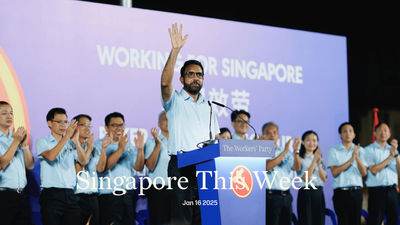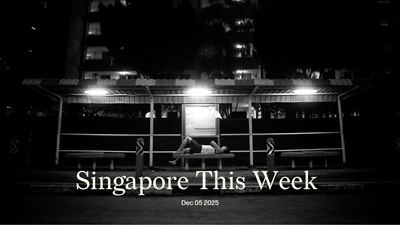Our picks
International: 104th time’s the charm
Among the many captivating entries in the diary of Murasaki Shikibu, the 11th century Japanese author, is a plaintive one. “If only you were a boy,” she writes, quoting her father. Women have forever vexed Japanese society, eliciting ridicule, rage, and retribution for any deviance from norms established by men. Much of it has been captured in academic and popular culture: the travails of an early 19th century woman who rejects domesticity; the weaponised paranoia engendered by “sexually deviant” women with “large vaginas” as Japan stands on the cusp of democracy; and their tribulations after the second world war.
21st century Japan isn’t much different. The country is in the bottom quartile of female political representation globally; among OECD nations, it’s one of the worst performers in female workforce participation, leadership roles, and the wage gap. That’s why the elevation of Sanae Takaichi as Japan’s first female prime minister, after 103 male leaders, is a big deal. Takaichi was elected leader of the ruling Liberal Democratic Party (LDP) earlier this month but her ascension to the top job was in jeopardy following a bitter split with the Komeito party, the LDP’s decades-old coalition partner. After an uncertain few weeks, another party filled the void to ensure Japan kept its tryst with destiny.
Will Takaichi usher in a more equal society? Some 13 Asian nations from Pakistan to the Philippines have had female leaders but nearly all rank low on global gender indices. Apart from Taiwan’s Tsai Ing-wen, the remaining dozen are dynasts propelled by the deaths of famous fathers or husbands, not gender-equality agendas. Few advanced women’s causes. Takaichi, by contrast, triumphed in a bruising intra-party contest against four men.
But any expectations of a new feminist wave in Japan will be misplaced. Takaichi’s 18-member cabinet has only two other women, partly reflecting Japan’s dire parliamentary skew—16 percent female representation versus 27 percent globally. The new PM is “someone who expresses ‘old man’ opinions from a woman’s mouth and makes them happy,” Mieko Nakabayashi, professor at Waseda University, told Bloomberg. Among those opinions is an aversion to work-life balance and an opposition to married couples having separate surnames for fear that family values will fray. Many, including Sylvia Lim, chairperson of Singapore’s Workers’ Party, feel that saddling women with the task of achieving equality is itself a gendered expectation.
Progressives have other concerns too. Takaichi is an arch-conservative who has downplayed Japan’s second world war crimes, and repeatedly, defiantly visited the Yasukuni Shrine, which honours Japan’s war dead, including convicted criminals. Previous visits from Japanese leaders have angered China and South Korea, both of whom suffered unspeakable horrors under the occupation. Takaichi opposes same-sex marriages and makes unverified claims to inflame support amongst anti-immigrant groups, mostly young men. The LDP’s coalition with the liberal Komeito party fractured partly because of these reasons; its new partner, the Japan Innovation Party, is more ideologically aligned. For now, it seems the progressives’ solace is in style sans substance: a woman with a love for heavy-metal, a passion for drums, and a fondness for motorbikes sits atop an orthodox society.
Business: It wasn’t me
It could be a scene from “Black Mirror”. Rows of smartphones arranged carefully on metal angle racks, their charging cables braided neatly, their screens abuzz with activity, in a brightly-lit room festooned with CCTV cameras. What exactly are these cocooned digital beings harvesting? Your attention, your soul, and eventually your life savings. A photograph from the US Attorney’s Office shows 1,250 mobile phones controlling 76,000 social media accounts that targeted perhaps millions of people globally in “pig butchering” scams. Singaporeans have been some of the most vulnerable. (Other victims include those trafficked to work at the scam factories.)
Best of all, our own are scamming us. In what’s been described by the FBI’s Kash Patel as one of the largest financial fraud takedowns in history—over US$14bn (S$18.2bn) of bitcoin seized—the US, in coordination with the UK, imposed sanctions on 146 targets affiliated with the Prince Holding Group, which had been grown by Cambodian national Chen Zhi into “one of Asia’s largest transnational criminal organisations”. Three Singaporeans and 17 Singapore-registered entities are implicated. The most notable is Chen Xiuling (Karen Chen). She’s a director, company secretary, or both, in all 17 entities, and manages Chen Zhi’s luxury yacht, among other things.
Bloomberg revealed much else. The two Chens had set up DW Capital Holdings Pte in 2018 here, which claimed to have received a 13x tax incentive from the Monetary Authority of Singapore. (The regulator said that it’s investigating any possible breaches). Karen Chen just resigned from the board of 17LIVE Group Ltd, a live-streaming platform in which Temasek holds a stake of about 26 percent (mostly through a subsidiary). And two other Temasek subsidiaries, The Ascott Ltd and Surbana Jurong, had performed services for Canopy Sands Development, a Prince subsidiary. (There’s a longer story, for another day, about how bitcoin and scams are connected to the base environmental destruction occurring in that grand Sihanoukville project, much involving Canopy.)
Temasek called Bloomberg’s article “at the very least mischievous” and said, among other things, that it was not involved in director appointments at 17Live and does not direct the business operations of its portfolio companies. But maybe it should get more stuck in? It’s not dissimilar to other dissociation attempts. When the Singapore Airshow hosted Israeli defence manufacturers, who used the genocide in Gaza as a selling point, the government said it’s a private decision. When Income Insurance squeezed the family of a mentally incapacitated septuagenarian, NTUC, like Temasek, said it’s uninvolved in the commercial decisions of its enterprises. There is a problem when accountability is sapped across diffuse supply chains. Singapore must nurture a more responsible form of stakeholder capitalism. “It wasn’t me” is too easy a cop out.
Some further reading: In “Is Singapore being used to finance wars?”, we examine our acceptance of what’s sometimes called Spiderweb capitalism, and our connections, if not complicity, in the wars in Myanmar and Ukraine.
Bravo: Lo De Wei, one of the Bloomberg journalists, is the same one who penned the article on Singaporean mansions that’s the subject of an ongoing lawsuit by K Shanmugam and Tan See Leng, two ministers. We’re glad he’s persisting with his work.
Society: The Palestine Letter-writing Organisation
Shortly after October 7th 2023, the Singapore government effectively banned all events and public assemblies pertaining to Israel and Palestine. The official crackdown had bizarre knock-on effects. For instance, attendees to Olivia Rodrigo’s 2024 concerts here had Palestinian insignia, like watermelon keychains, removed by overzealous security before they entered. As remarkable, however, were the persistent efforts by ordinary Singaporeans to circumvent the censorship and stuffiness. Recall the extraordinary incident in April 2024 at Gardens by the Bay, where three people unfurled a banner that read “End SG-Israel Arms Trade”; and the memorial this January involving a group called Students For Palestine Singapore, that left some 100 pairs of shoes in front of NUS’s CREATE research building, which houses a research alliance with the Hebrew University of Jerusalem.
While Singapore’s typically scrupulous police have curiously yet to find those “suspects”, other more obvious “protestors” have been publicly dealt with, such as the young women who attended the Meet the People session by K Shanmugam earlier this year, and left him shaken. Arguably the most high-profile incident occurred in February 2024. Some 70 people gathered outside Plaza Singapura and circled the adjacent Istana to deliver letters to the prime minister’s office. They carried watermelon umbrellas and posed with them. Just months into the “conflict”—now considered a genocide—the images circulated on social media galvanised many in Singapore, a shot in the arm for a body politic suffering from state-induced lethargy. The group comprised several public figures, so it was unsurprising when three of them, Siti Amirah Mohamed Asrori, Annamalai Kokila Parvathi and Mossammad Sobikun Nahar, were charged in June 2024, all relating in some way to “organising a public procession in a prohibited area.”
What was surprising, even for the defence, was their acquittal this week. In doing so, the judge said the women had an honest and reasonable belief that they were not in breach of any prohibited areas order. Many people walk along the perimeter of the Istana without realising it’s a “prohibited area” under the Public Order Act, and others have previously trod the same path to its back gate to deliver letters. If found guilty, each of them could have faced a fine of up to S$10,000, or imprisonment for up to six months, or both.
The Attorney-General’s Chambers has said it intends to appeal the decision, though till then we’re enjoying a rare moment where most conservatives and liberals might savour a contentious decision. A guilty verdict might have sparked a fresh bout of polarisation amidst relative calm in the Israel-Palestine debate, following the arrival of Palestinian students here and the fragile peace there. The sartorially-inclined will remember the way the defendants dressed to court. Like Pritam Singh and his lawyer a year ago—contest of the suits—Asrori, Koki, and Sobikun also delighted their fans and caught the cameras with waves of colours and keffiyehs, style and grace in the face of oppression.
Society: Caring for caregivers
“My wife, Joan, is screaming, and hitting out wildly at the stranger in her bed. She is greatly agitated and frightened. ‘Get away from here. Get out!’
But the man she perceives as a stranger is me, her husband of more than 40 years…”
In The Soul of Care: The Moral Education of a Husband and a Doctor (2019), Dr Arthur Kleinman confessed how unprepared he was to be a primary caregiver despite a lifetime studying care. “A veil of ignorance was raised from my eyes,” said the Harvard professor of psychiatry and medical anthropology, who looked after Joan for 11 years until her death in 2011. She had an atypical form of Alzheimer’s that robbed her of memory, movement, and independence. “What is that veil of ignorance about? It’s about recognising just how difficult family care is for [people with] dementia and…many other problems.”
Every dementia story is unique. Yet, across cultures and class runs a shared emotional and moral terrain steeped in loss, grief, resentment, isolation and guilt. Caregivers navigate burnout, a loved one’s behavioural and functional changes, and the constant juggling of work, family, and duty. A recent Dementia Singapore survey found that caregivers slept only 6.1 hours a night, while providing an average of 217 hours of care per month—equivalent to about nine days of unpaid work, valued at a median of S$1,218.75.* Their duties range from toileting and feeding, to housework, transport, and supervision.
The financial toll is just as heavy. A family here can expect to spend over S$380,000 across a decade caring for someone with dementia. Costs rise by roughly 33 percent as the disease progresses from mild to moderate. Government schemes can offset up to 36 percent of these expenses. But care “remains a significant expense and time commitment”, the social service agency noted. Although 62 percent of respondents received some aid, nearly nine in 10 believe more can be done.
As Singapore’s population greys and life expectancy lengthens, the number of residents aged 60 and above living with dementia is projected to more than double to 152,000 by 2030. The coming care crisis will require a national strategy that centres not only patients but caregivers too. This also means addressing the rise of one-person households and “kinless” ageing in a society where fertility rates remain below replacement levels, and more adults stay single or childless. The future of care must expand the professionalised care economy, ensuring accessibility and fair wages; community-based caregiving; embrace co-living models; and perhaps even universal long-term care coverage.
Still, Dr Kleinman reminds us that when the labour feels unbearable, caregivers must “keep your liveliness…the presence of who you are…” Between exhaustion and moments of unexpected tenderness, caregiving becomes not just a duty, but a fundamentally human act of endurance and love.
Some further reading in: “The youthful faces of caregiving” and “Generational shifts in caregiving”.
* These figures are taken directly from the report. Jom has written to Dementia Singapore for clarification—because 217 hours appears to be equivalent to over 27 eight-hour working days—and will share an update here when we hear back.
Addendum: Dementia.sg has clarified that "nine-full days of unpaid work" is based on a 24-hour workday since caregiving takes place around the clock.
Society: Becoming a caring city
Step into Terminal 2 of Changi Airport. Pillars of manicured foliage draw your gaze upwards to a digital sky of clouds drifting lazily, mirroring the weather outside. Around you, the bright lights of storefronts. Beautiful? Sure. But when paired with the rattle of luggage wheels and the chatter of people, airports can be overwhelming for neurodivergent travellers. A new sensory-friendly space in the terminal’s departure transit area could offer respite. “The Calm Room” is part of the Changi Airport Group’s CARE@Changi programme, aimed at creating more inclusive travel experiences. Spread across 200 sqm, it’s divided into four zones: the Welcome area, the Forest, the Den and the Nest. The interiors have a neutral colour palette and soft furnishings where “travellers can take a moment to regulate, recharge and prepare for their journey.”
Changi is also part of the Hidden Disabilities Sunflower initiative through which people with extra support needs are given sunflower lanyards to identify themselves to trained staff who don distinct gold Care Ambassador pins. The initiative started at Gatwick Airport in 2016 and has since expanded to 70 countries, 327 airports, and 23 airlines, and also spread to businesses, public transport services, healthcare, education and government agencies.
In Singapore, organisational and government support for people with disabilities has grown. The National Gallery and National Museum have spaces similar to Changi’s “The Calm Room” while NParks has created therapeutic gardens for those with autism, anxiety and depression. Yet, public sentiment remains contradictory. One local study found a dip in positive attitudes toward persons with disabilities from 76.8 percent in 2019 to 68.9 percent in 2023. The drop was sharper towards those with less visible problems such as intellectual disability and autism. Although the study did not posit reasons for the decrease, it found that respondents who had interacted with persons with disabilities were more likely to have a positive attitude than those who don’t. Intentional urban design with public spaces that encourage everyday interaction can help nurture empathy and understanding not only towards those with extra needs, but society as a whole.
As George Simmel, a German sociologist, observed, the relentless sensory stimulus so characteristic of urban living makes huge demands on the brain. As mental fatigue sets in, we often become indifferent or detached. Over time, this can breed feelings of isolation and weaken social bonds. Urban design can play a crucial role in countering this effect. For instance, adding greenery helps buffer against overstimulation, while arranging public furniture to bring strangers physically closer encourages conversation. Such social spaces are often contentious here—associated with loitering, noise, and even being occupied by rough sleepers. As we grapple with these tensions, perhaps what we need is a deeper interrogation of what it truly means to coexist: to build not just a liveable city, but a “we over me” Singapore.
Arts: We Can Save The Cinema!!!
“We Can Save The World!!!” was all set for its local premiere. The madcap sci-fi comedy had all the makings of a cult hit: a burnt out town council officer goes in search of a missing recycling bin, only to run into a dishevelled man claiming to be an alien. Here was a screwball caper for the local palate, garnished with plenty of civil service in-jokes, a sprinkling of audience participation, and the can-do flavour of art made with no state funding. The team had rallied investors who were fans of director Cheng Chai Hong’s work, and were coming off the high of an enthusiastic crowdfunding campaign over Indiegogo. They’d sealed the deal with beloved indie cinema The Projector for an August 1st opening. Then, a plot twist and a cliffhanger. The Projector folded without warning. The team, already in talks with Cathay Cineplexes, were relieved they’d had a back-up plan. “The next thing we knew, we woke up on a Monday morning and found it had also stopped operations,” producer Martin Loh told The Straits Times (ST). But an indie survivor merits an indie superhero. Enter fff.forever. This 700-strong volunteer-run community of cinephiles is determined to bring people back into theatres. They raised almost S$7,000, bought out an entire 278-seater at Orchard Cineleisure, and handed out free tickets to strangers at Nex shopping mall. The film was screened to a packed theatre earlier this month. Their meticulous Telegram group has an arrival “lobby” and 10 channels where members can swap film recommendations and industry news, or organise screenings and share resources. One recent labour of love is Filmbulletin.sg, which consolidates Singapore’s non-mainstream film events into a one-stop digital bulletin board—with a convenient calendar view so you can schedule in that mid-week film treat.
“...trying to ‘solve’ the problem of cinema culture is an insane thing to do,” fff.forever volunteer Benjamin Yap told RICE. “What is more productive is cultivating small communities.” The group isn’t Singapore’s only ground-up, close-knit Telegram community for arts lovers; there’s also Channel NewsTheatre for theatre fans, and Sing Lit is LIT for the textually inclined. Each boasts over 1,200 members who discuss shows, swap tickets, and offer industry-specific support. “anyone here that has had experience running their own initiative or magazine, may i please dm you for tips?” went a recent plea, “i am considering starting my own, but i do not know where to start and am concerned that it will not make it far :')”. This was followed by a deluge of encouraging responses. “If each of us engages with art within our own circles, it will create something bigger over time,” Yap added, “the aggregation of all those energies will be in one direction, but you don’t have to move the whole ship. It’s actually a bunch of very, very small sampans.” And a fleet of several hundred sampans might just turn those cinematic tides.
Arts: The show must go on
One genre is animated by real life; the other animates it. The documentary and the cartoon are seizing their time in the spotlight by way of two niche festivals: the inaugural Doc Edge Singapore, and the return of the Cartoons Underground festival. Each will present a slate of local and international features, accompanied by masterclasses and workshops. The Singapore Film Society inked an MOU with the prestigious New Zealand documentary festival last month, and the full festival will run at various Golden Village cinemas in March next year. This is an Oscar-qualifying festival, meaning that if your film wins an award here, you can submit it for consideration at the Academy Awards. Audiences will get a taste of what’s to come with the Singapore premiere of “A Quiet Love” in December, featuring the love stories of three Deaf couples from Ireland: one that straddles a tense religious divide; one where a queer couple negotiates parenthood with their Deaf and hearing kids; and one where a Deaf boxer and his hearing partner must confront a life-changing decision. The against-all-odds film feels like a metaphor for the staggering hurdles that the artform must navigate in contemporary Singapore. It’s a call to action echoed by the upcoming Singapore International Film Festival (SGIFF), set to announce its full programme later today. “Despite surviving many ‘near-deaths’ in its history,” said SGIFF programme director Thong Kay Wee in a press statement, “we will continue to demonstrate how cinema has persevered in quality and relevance, especially in today’s extraordinarily difficult times.” The country’s flagship film festival is doubling down on local work, and will present over 30 films by Singaporean filmmakers, including the documentaries “Coda”, a portrait of the alumni choir Victoria Chorale, and “10s Across the Borders”, a portrait of the pioneers of South-east Asia’s queer and trans ballroom scene.
Cartoons Underground has also persevered in a cinema-unfriendly climate. “We were very close to not being able to stage the festival this year,” its co-founder Vicky Chen confessed in its press statement. They found a new refuge in *SCAPE, and will screen indie animated shorts from both Singapore and abroad over an afternoon and evening on November 1st. Experimental shorts by Singaporean students will occupy the screen alongside seasoned hands; in “My Popo’s Favourite Colour is Yellow” by emerging illustrator Winnie Chua, a girl drifts through memories of her grandmother’s home, and in “Pear Garden”, the award-winning Iranian animator Shadab Shayegan explores a granddaughter-grandmother bond post-surgery. In a post-Projector, post-Cathay world, the film industry’s putting on a brave face; it’s up to us to make Singapore a brave space for movie magic.
Abhishek Mehrotra, Sakinah Safiee, Corrie Tan, Tsen-Waye Tay, and Sudhir Vadeketh wrote this week’s edition.
If you enjoy Jom’s work, do get a paid subscription today to support independent journalism in Singapore.








